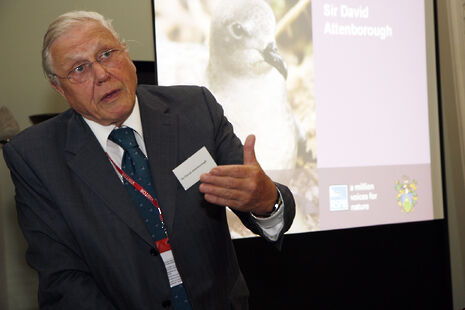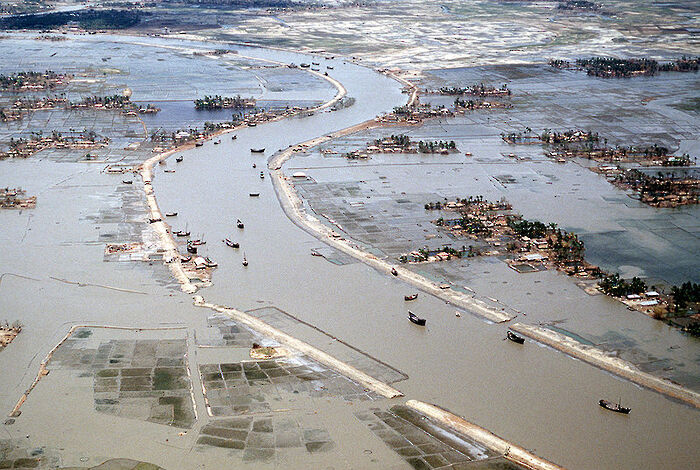Blue Planet II: A call to action
Marcus McCabe explains why Blue Planet, like all of Sir David Attenborough’s work, should do more than simply entertain us on a Sunday evening.

After a four-year hiatus, the visually stunning, epically moving Blue Planet II is back on our screens. On Sunday, over 10 million viewers were edified by the gentle commentary of national icon David Attenborough, moved by the tides of Hans Zimmer’s mesmerising soundtrack, entranced by exquisite shots of the beguiling deep and the creatures who thrive there.
However, it was the closing scene which truly melted the hearts of a nation: as icecaps thaw and the sea rises we see a desperate mother walrus battling to hold her baby afloat with no ice floes to rest on. As a result of this final act, Twitter was flooded with shock and condemnation of the effects of human impact on our climate and the sea life we share it with. But this is by no means a new revelation; the scientific realities of climate change have been well broadcasted for decades and yet it feels as if we haven’t shown due interest in our environment since The Blue Planet originally hit BBC1.
“If we do not escape the myopia of our TV screens and our consumer lifestyles, Attenborough’s call to action may melt into elegy”
Through cinematography that delves deep down into the unknown, doing justice to the complex habits of the creatures who live there, Blue Planet II makes abstract statistics about global warming specific, palpable and relatable. Showcasing a mastery of storytelling – from the tuskfish that uses tools to break open a shell, to the herd of walruses trying to protect their young from a starving polar bear – we recognise age-old tales of adversity played out dramatically in the new, blue arena of the oceans. The mournful violence we witness between the mother walrus and her kin, fighting for a place on a crowded slab of ice until it disintegrates, doesn’t strike of nature red in tooth and tusk, but of the insidious, removed influences of human enterprises that we must own up to, try to counteract.
Empathy and self-awareness are evoked in equal measure through the documentation of common patterns of experience between species, serving an important function in raising interest in marine conservation for viewers. However, it seems profoundly worrying that we require this submarine windscreen in our front rooms to remember widely documented facts of human destruction. Should we not foster an intrinsic respect for lives other than our own without requiring the visual reminders of cinema? Should we not act pre-emptively to stop tragedies of death and extinction before we can see them play out on our wildlife programmes?
It is human nature to think within the parameters of our direct proximity – whether that be in the tirelessly documented Cambridge bubble, the wider world of work and mortgages, or in caring for those immediately close to us – but now that the more pervasive problems of conservation and climate change have re-emerged into our sphere of concern, it is vitally important to leave the disengagement of our television screens and be proactive. Blue Planet II brings our environment back, once again, into collective conscience but this time we must do more than consume, tweet and wait for Blue Planet III.
Instead, we should do all we can to fight for our world. As Attenborough puts it, this is “our blue planet” and now, more than ever, we must consciously share it. As Arctic sea ice diminishes by 13% every decade, we should contact our MPs calling for immediate action on climate change and marine conservation. With one-quarter of coral reefs worldwide already considered damaged beyond repair, we should be conscious of our own role in global warming, at the very least switching off lights and using renewable energy. With global temperatures predicted to increase by up to 5.8% by the end of the century, we should reduce the levels of our waste and make sure we recycle what we do throw away. We should travel green, eat sustainable foods and, where we can afford to, we should support and donate to those organisations who are directly involved with cleaning up our oceans and stabilising our climate.
In a political environment where Donald Trump can withdraw from the Paris Climate Accord with very little in the way of consequences, our geographical environment is more at risk than ever before. Blue Planet II is an enjoyable piece of television, but much more significantly, it should be a necessary reawakening of our duty to this environment’s wonderful yet waning beauty. If, this time, we do not escape the myopia of our TV screens and our consumer lifestyles, Attenborough’s call to action may melt into elegy, becoming a documentary masterpiece that we look back on to commemorate marine paradises of the past
 News / Judge Business School advisor resigns over Epstein and Andrew links18 February 2026
News / Judge Business School advisor resigns over Epstein and Andrew links18 February 2026 News / Gov grants £36m to Cambridge supercomputer17 February 2026
News / Gov grants £36m to Cambridge supercomputer17 February 2026 News / Hundreds of Cambridge academics demand vote on fate of vet course20 February 2026
News / Hundreds of Cambridge academics demand vote on fate of vet course20 February 2026 News / CUCA members attend Reform rally in London20 February 2026
News / CUCA members attend Reform rally in London20 February 2026 News / Union speakers condemn ‘hateful’ Katie Hopkins speech14 February 2026
News / Union speakers condemn ‘hateful’ Katie Hopkins speech14 February 2026










